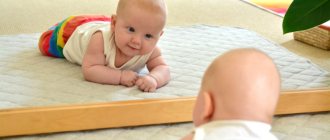The position that a newborn baby takes during sleep, in most cases, repeats the position in which he was in the womb for nine months. If the baby is placed on a flat surface, he will immediately curl up and try to roll over onto his tummy. There is a point of view that lying on a child's stomach is very dangerous. Why a number of experts think so, and how serious the real threat is, is worth finding out.
Many babies happily sleep on their stomachs
Acceptability of sleeping on the stomach
At the end of the last century, American scientists described Sudden Infant Death Syndrome. Its main cause was said to be spontaneous cessation of breathing in a child, for example, if he sleeps with his face buried in a pillow. Due to poorly developed breathing skills and the inability to turn their head to the side, a baby in this position can easily suffocate. Despite the fact that there has not been 100% evidence of a direct relationship between sleeping on the stomach and sudden death syndrome, many pediatricians still recommend that parents refrain from putting the baby to sleep on the tummy to avoid undesirable consequences.
Important! All babies are different. If the mother sees that the baby is comfortable sleeping on his stomach, there is no need to be nervous and prevent this.
How to prevent your baby from rolling over?
If turning your baby onto his tummy during sleep causes excessive anxiety, you can try to prevent the process:
- Swaddle your newborn before bedtime.
- Place your baby on his side in the playpen before going to bed. And place soft cushions under the tummy and back.
- Change the crib to a stroller cradle or a “cocoon nest” that limits the baby’s activities.
- Sleep together with the baby, controlling the baby's sleep positions.
- Place the baby to sleep immediately on his tummy with his head turned to the side.
Contraindications
Is it possible for a 5 month old baby to have a banana - how to administer it
Whether or not to believe that sleeping on your stomach can cause sudden infant death syndrome is a personal choice for each parent. There are cases in which such a sleeping position is strongly recommended to be avoided. We are talking about the following points:
- If the baby has pathologies related to the functioning of the central nervous system.
- If the child sleeps without parental supervision.
- If the baby does not change position during the entire sleep period.
The famous doctor Komarovsky has his own opinion on what to do if a child turns over on his stomach at night. The specialist is convinced that under no circumstances should a baby sleep face down if the mattress in his crib is too soft and the air in the children’s room is dry and warm. If the baby is still very small, he should limit the space in such a way that it would be problematic for him to roll over, stand up or crawl.
There is no consensus on the acceptability of a child sleeping with his butt up
Safe sleep rules for your baby
In what position should a baby sleep?
Only sleeping on your back is considered safe.
Leading pediatric organizations in the world talk about this. As experts note, unfortunately, very often doctors give parents incorrect recommendations on children's sleep, for example, they recommend placing babies on their sides. There is no need to do this, since the position on the side creates the risk of turning over onto the stomach, which in turn threatens respiratory depression and regurgitated milk entering the respiratory tract. On their backs, babies can burp and immediately swallow liquid: they are designed in such a way that they can breathe and swallow at the same time. In addition, you should not put anything unnecessary in your child’s crib: no pillows, no diapers, no positioners or sleep bolsters. All this is unsafe.
The baby normally falls asleep only on his stomach. Is it possible to leave him in this position in the crib?
See, the thing is that babies actually sleep lightly if they lie on their backs. But this is natural - such shallow sleep is a defense mechanism against sudden infant death syndrome, the risk of which is especially high in the first six months of a baby’s life. So look at the situation from a different angle: his ability to wake up so quickly and sleep lightly suggests that he insures himself and ensures his safety. If you find it very difficult to put your baby on his back in the crib, try loose swaddling; it often comes to the aid of children who are especially sensitive to the moment of contact with the mattress.
But if the baby turns over on his stomach in his sleep, what should he do?
If your baby is already rolling over on his tummy in the crib, he's probably about three to four months old, right? Baby sleep specialist Jodi Mindell says it's normal to sleep on your stomach for a while at this age. The fact is that by three to four months the child’s muscles are already strong enough for him to move so that his head takes the safest position. Sleep positioners or soft feeding pillows should not be used in such cases. Leading pediatricians believe they pose a high risk of suffocation.
It is clear that because of this, the sides are also not allowed. But is there a risk that the child will injure himself in the crib?
When choosing a crib, pay attention to the distance between the bars of the lattice. It is best to choose one whose lattice resembles a fence - such a picket fence will definitely not harm the child. But bumpers pose a real threat - a baby can bury his face in them and suffocate. If you think this is impossible, check out the statistics. In addition, older babies use the sides as a jump to get out of the crib after sleep - this also creates a risk of serious injury if they fall.
When can a child sleep with plush toys?
For at least one year, a child should not have any pillows, blankets, bumpers, or toys in the crib. With a small soft toy, your baby may fall asleep in your arms, but after you put him in his crib, the stuffed friend needs to be put away.
Advantages
List of things for a newborn
If a child turns over on his stomach at night, you should not panic at all and rush to turn him back, especially if the baby is not one month old, but a little older (for example, six months).
Many parents note that a baby laid on its tummy can sleep longer and more peacefully than in other positions. This is due to the following reasons:
- the baby does not interfere with himself with his hands;
- in this position the throttles are released better;
- there is no risk that an infant will suffocate when regurgitating;
- accelerates the development of neck and abdominal muscles;
- intestinal function improves:
- hip joints form faster;
- The development of miliaria is excluded, since nothing is rotting.
Can a baby sleep on his stomach?
A newborn should gradually become accustomed to different sleeping positions.
Babies do not always wake up after turning over from their back to their tummy. Sometimes they sleep peacefully in this position until the next feeding. But then mom worries. The child's pose makes you think about the inconvenience: the baby practically stands on his knees, pulling his legs towards his stomach. Do not worry. This position is quite natural for a baby. Remember the position of the child in the womb. Isn't it very similar?
The benefits of sleeping on the stomach for infants are obvious:
- In case of excessive regurgitation, the position eliminates the possibility of choking.
- The baby does not throw up his arms in his sleep, which means he does not wake himself up.
- The load on the spine is reduced.
- During inversion, the abdominal muscles work, improving intestinal motility.
- By turning the head from one side to the other while sleeping, the child strengthens the neck muscles.
- The blood supply to the brain improves due to the position in which the lower part of the body is elevated.
If your baby rolls over onto her stomach and doesn't wake up, don't worry. Let your baby choose his own resting position.
Waking up when turning over on stomach
Baby chokes while feeding breast milk
In some cases, the baby turns over on his stomach in his sleep and wakes up from this. Most often, these two processes are very indirectly related to each other. Therefore, if a child turns over on his stomach in his sleep, and also begins to cry when waking up, you should make sure that the baby could not have woken up because he was simply uncomfortable. First of all, you should make sure of the following:
- whether folds have formed on the bedding that are rubbing the baby’s delicate skin;
- whether the infant is tangled in the blanket;
- is the diaper wet?
- Are the clothes he sleeps in comfortable?
- Is the baby cold?
- Is the baby having difficulty breathing?
There are also purely physical reasons why a child rolls over on his stomach at night and wakes up crying:
- bloating;
- colic;
- congestion of the intestines or stomach;
- teething;
- increased body temperature;
- nasal congestion and much more.
The position on the stomach itself cannot provoke the awakening of the baby. If the baby is comfortable, he will continue to sleep peacefully. If the child does wake up, you should find the reason why this happened. If there are obvious signs of fever or pain, it is strongly recommended to immediately consult a pediatrician, gastroenterologist or neurologist, depending on the identified symptoms.
If parents adhere to the unconfirmed hypothesis that sleeping on the stomach can trigger the development of sudden infant death syndrome, and are willing to stand near the baby's crib all night to promptly turn him from the tummy, they can prevent the process in one of the following simple ways:
- swaddle the baby before bedtime;
- place the baby on its side, placing cushions under the back and tummy;
- organize a place for the baby to sleep not in a crib, but in a cradle from a stroller, where his movements will be limited;
- Immediately put the baby to sleep on his tummy, while turning his head to the side so that his nose can breathe freely.
It is healthier for babies to sleep without a pillow at all.
Possible causes of coups
If a child turns on his stomach and begins to cry, the root cause of this should be identified.
First you need to check if the child is comfortable:
- no folds appeared on the bed or in things that cause discomfort to the baby’s delicate skin;
- whether the baby’s breathing is difficult due to non-compliance with temperature, humidity, cleanliness and lack of dust in the room;
- the baby is hot or cold;
- is the diaper dry, comfortable clothes, a cap without ties;
- whether the child is twisted in diapers or a blanket;
- whether the child is exposed to air from the air conditioner or heat from heating devices;
- Is there any loud noise or light in the room?
If the above reasons have been eliminated, but the child begins to cry as soon as he turns over on his stomach, the physical causes of the baby’s anxiety should be eliminated:
- Colic, bloating, discomfort and pain in the tummy. In this case, the baby cries for a long time without calming down, pulls up his legs, is capricious, and asks to be held in his mother’s arms.
- Congestion of the digestive system and intestines. Children who are introduced to complementary foods at 4 months may not yet be ready for such foods. Even if complementary foods are introduced after 6 months, the baby’s body may not yet be ready to accept “adult” food - it has not produced the required amount of enzymes for processing.
- Increased muscle tone. A characteristic sign is the head tilted back upward during sleep, the arms pressed tightly to the body.
- Poor development of the nervous system. In this case, the baby jerks his limbs sharply and scares himself.
- Teeth are coming through.
- Nasal congestion, runny nose, breathing problems.
- Increased body temperature caused by infections, viruses or after vaccination.
- An allergic reaction, which may be accompanied by other symptoms: itching, redness of areas of the body, rash, rapid heartbeat, difficulty breathing.
These reasons are a reason to contact a pediatrician, neurologist or gastroenterologist to determine treatment options.
Safety precautions when sleeping on your stomach
Children's sleep is a very delicate process. If you do everything correctly and follow the necessary safety measures, a child at any age can be safely placed on his tummy. These are five easy-to-follow recommendations:
- The baby should be placed to sleep on its tummy without a pillow. It is better to abandon it altogether until the child turns one year old. The fact is that a pillow increases the risk of breathing blockage during sleep. There is no need to be afraid that without a pillow, the child’s cervical vertebrae will form incorrectly, and in the future there will be a crooked neck. This is nothing more than idle speculation.
- The mattress in the crib must be hard and as even as possible. First, sleeping on a relatively hard surface will minimize the risk of pinching your nostrils. Secondly, it will contribute to the normal development of the musculoskeletal system.
- The children's room should be thoroughly ventilated before putting the child to bed.
- If the indoor air is too dry or too warm, the mucus in the nasal passages dries out and breathing becomes difficult. If at the same time the baby buries his nose into a soft mattress or pillow, the result may be the most disastrous.
- If a child has a runny nose before going to bed, he should thoroughly clean his nose.
In addition to the above, you should also make sure that there are no foreign things or objects in the baby’s crib: clothes, blankets, spare diapers, etc. The fact is that, tossing and turning in his sleep, the child may accidentally pull objects over his head or bury himself in them face. You should not put your baby to bed immediately after feeding. It should be carried on the handles in an upright position for some time, so that the air that enters the body along with food leaves the intestines.
Babies can fall asleep in the most unimaginable positions
Summarizing the above, it is not possible to unequivocally answer the question whether or not a newborn baby can sleep on his stomach. If parents fully comply with the necessary safety measures, and the baby himself finds the position most comfortable, this is quite acceptable. If parents are not convinced that they can adequately ensure the safety of the baby while sleeping on his stomach, it is better to play it safe and turn the baby over.
Sleeping on your stomach and safety
Despite all the fears and concerns of mothers and fathers, sleeping on the tummy is necessary for a child, in the absence of contraindications. It is only important to ensure the safety of the baby:
- Carry out a set of gymnastic exercises with your child that strengthen the baby’s body;
- iron the baby’s things and bed;
- buy a hard mattress, remove the pillow;
For children under one year old, the pillow is contraindicated; a diaper folded in four is sufficient.
- Do not put soft toys or rattles in the playpen. The former can cause allergies, the latter can wake up the baby;
- hang bumpers on the playpen to prevent the child from bumping;
- when bathing, add chamomile decoction to the bath, which calms the nervous system;
- an hour and a half before bedtime, exclude active games and cartoons;
- ventilate and moisten the room, iron things and beds;
- after feeding, carry the baby vertically in your arms, and only then transfer him to the playpen;
- Avoid using detergents with fragrances.
Some people associate sudden infant death syndrome with falling asleep on the stomach, but the assumptions have no scientific basis.











